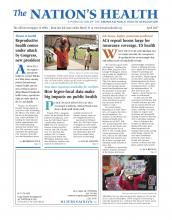Chronic pain hits older adults who have less money and less education the hardest, a new study finds.
Adults ages 51 and older in the lowest household wealth and education brackets are not only more likely to suffer from chronic pain than those who are wealthier and higher educated, but they also experience it more severely.
The study, published in February’s Pain, looks at 12 years of data from the national Health and Retirement Study for more than 19,000 people, focusing on chronic non-cancer pain. According to the study, people who did not have high school degrees reported pain scores more than twice as high as those for people with graduate degrees. The least affluent respondents also reported average pain scores that were 78 percent higher than those for the wealthiest respondents.
Women reported 38 percent higher pain scores than men on average. In addition, people with less money and education were found to experience more pain-related disability that prevented them from carrying out their regular activities such as household chores and work.
A significant association between chronic pain and death was also identified, with those who died during the study having reported pain scores 31 percent higher on average than survivors.
Reasons for disparities in pain are not completely understood and require further research, said study author Hanna Grol-Prokopczyk, PhD, assistant professor in the Department of Sociology at the State University of New York at Buffalo. However, people with lower socioeconomic status may have less access to high-quality health care or more physically demanding jobs, among other possible reasons for disparities, she said.
The study found high prevalence of chronic pain: 27.3 percent of respondents in 1998 reported they were often troubled by pain, compared with 36.6 percent of respondents in 2010. It also found that chronic pain has been increasing by period, with people in their 60s in 2008 reporting worse pain than the age group did in 1998. Grol-Prokopczyk offered several possible reasons: People may be more readily reporting their pain; suffering from opioid-induced hyperalgesia, in which exposure to opioids leads to increased sensitivity to pain; or experiencing other health issues contributing to their chronic pain.
Prescribing opioids for chronic pain has been complicated by a nationwide opioid crisis. However, public health “can be committed to chronic pain while looking for safer treatments,” Grol-Prokopczyk told The Nation’s Health, noting that opioids may not have to come off the table completely.
“If more people realized that over a quarter of the population in this age group is dealing with regular pain, it might make it clearer that this is a really important topic to address,” she said, adding that people with chronic pain generally do not fabricate their condition to obtain opioids.
For more information, visit http://journals.lww.com/pain/pages/articleviewer.aspx?year=2017&issue=02000&article=00016&type=abstract.
- Copyright The Nation’s Health, American Public Health Association









